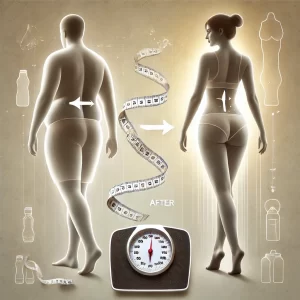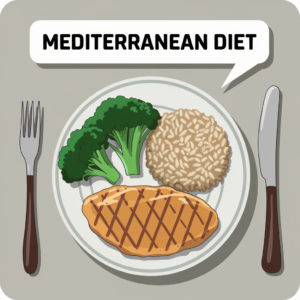How to Lose Weight with the Whole30 Diet: A Step-by-Step Guide for Beginners
Introduction to the Whole30 Diet
The Whole30 diet is a 30-day clean-eating plan designed to reset your eating habits by eliminating sugar, alcohol, grains, dairy, legumes, and processed foods from your diet. The goal is to focus on whole, nutrient-dense foods that promote health and wellness while helping you identify foods that may trigger inflammation or cravings. Developed by Dallas  and Melissa Hartwig in 2009, the Whole30 diet has gained popularity for its ability to help people lose weight, improve digestion, and increase energy levels. In this guide, we’ll explore how the Whole30 diet works, its benefits, and how to follow it successfully for weight loss.
and Melissa Hartwig in 2009, the Whole30 diet has gained popularity for its ability to help people lose weight, improve digestion, and increase energy levels. In this guide, we’ll explore how the Whole30 diet works, its benefits, and how to follow it successfully for weight loss.
How the Whole30 Diet Works for Weight Loss
The Whole30 diet works for weight loss by encouraging you to eliminate processed and inflammatory foods, which are often high in added sugars, unhealthy fats, and empty calories. Instead, the diet focuses on whole, unprocessed foods like vegetables, fruits, lean proteins, and healthy fats, which provide essential nutrients and help keep you full and satisfied without overloading on calories.
By eliminating foods that may cause cravings or digestive issues, the Whole30 diet helps you develop a healthier relationship with food and understand how certain foods impact your body. This awareness can lead to long-term changes in eating habits, which support sustainable weight loss beyond the initial 30 days.
Key Foods in the Whole30 Diet
- Vegetables: Non-starchy vegetables like spinach, kale, broccoli, and bell peppers are encouraged, as they are low in calories and high in nutrients.
- Fruits: While fruit is allowed, it should be eaten in moderation due to its natural sugar content. Focus on whole fruits like berries, apples, and citrus.
- Lean Proteins: High-quality proteins such as grass-fed beef, free-range chicken, eggs, and wild-caught fish are staples of the Whole30 diet. These proteins help maintain muscle mass while promoting fat loss.
- Healthy Fats: Fats from avocados, olive oil, coconut oil, and nuts are encouraged, as they provide satiety and essential fatty acids.
- Herbs and Spices: Natural herbs and spices are allowed to add flavor to meals without relying on processed condiments or added sugars.
Benefits of the Whole30 Diet for Weight Loss and Health
The Whole30 diet offers several benefits, many of which contribute to weight loss and improved health. Here are some key advantages:
1. Eliminates Processed Foods
One of the primary benefits of the Whole30 diet is the elimination of processed foods, which are often high in unhealthy fats, sugars, and additives. By focusing on whole foods, you can reduce your calorie intake while consuming more nutrient-dense options that support weight loss and overall health.
2. Reduces Inflammation
The Whole30 diet eliminates foods that are known to  cause inflammation, such as processed sugar, grains, and dairy. Inflammation is linked to weight gain and a variety of health issues, including heart disease and digestive problems. By removing these foods from your diet, you may experience reduced inflammation and improved overall health.
cause inflammation, such as processed sugar, grains, and dairy. Inflammation is linked to weight gain and a variety of health issues, including heart disease and digestive problems. By removing these foods from your diet, you may experience reduced inflammation and improved overall health.
3. Promotes Healthy Digestion
Many people who follow the Whole30 diet report improved digestion, as the diet eliminates common triggers like dairy, gluten, and processed foods. By focusing on whole foods rich in fiber, such as vegetables and fruits, the diet promotes regular bowel movements and supports gut health, which is essential for weight management.
4. Controls Cravings and Emotional Eating
The Whole30 diet helps break the cycle of sugar and carb cravings by eliminating these foods for 30 days. This can lead to improved self-control around food and a healthier relationship with eating, as you learn to rely on whole foods that provide lasting energy and satiety. By reducing cravings and emotional eating, many people find it easier to maintain a calorie deficit, which is necessary for weight loss.
5. Increases Energy and Mental Clarity
Eliminating processed foods and sugar from your diet can lead to improved energy levels and mental clarity. Many people report feeling more focused and energized after the first week of the Whole30 diet, which can make it easier to stay active and motivated to reach your weight loss goals.
Potential Drawbacks of the Whole30 Diet
While the Whole30 diet offers many benefits, there are some potential challenges to consider:
1. The Diet Is Restrictive
The Whole30 diet is highly restrictive, especially for people who are used to eating grains, dairy, and processed foods. The elimination of these foods can feel overwhelming at first, and it may take time to adjust  to the new way of eating. Meal planning and preparation are essential for success, as it can be challenging to find Whole30-approved options when dining out or on the go.
to the new way of eating. Meal planning and preparation are essential for success, as it can be challenging to find Whole30-approved options when dining out or on the go.
2. Short-Term Nature
While the Whole30 diet can jumpstart weight loss and help you develop healthier habits, it’s designed to be a 30-day program. To maintain your weight loss and health improvements, it’s important to develop a long-term eating plan that incorporates the lessons learned during the Whole30.
3. Risk of Nutrient Deficiencies
Because the Whole30 diet eliminates entire food groups, such as grains and legumes, there is a risk of nutrient deficiencies, particularly in fiber, calcium, and certain vitamins. It’s important to plan meals carefully and include a variety of nutrient-dense foods to ensure you’re getting all the necessary nutrients during the 30 days.
Tips for Success on the Whole30 Diet
To maximize your success on the Whole30 diet and achieve your weight loss goals, follow these practical tips:
1. Prepare Your Kitchen for Success
Before starting the Whole30, clean out your kitchen and remove any non-compliant foods, such as processed snacks, dairy, grains, and sugary condiments. Stock your pantry and fridge with Whole30-approved foods like fresh vegetables, lean proteins, and healthy fats. This will make it easier to stay on track and avoid temptation during the 30 days.
2. Plan Your Meals Ahead of Time
Meal planning is essential for success on the Whole30 diet. Take the time to plan your meals and snacks for the week, and prepare as much as possible in advance. Having healthy, Whole30-approved meals ready to go will reduce the temptation to reach for non-compliant foods when you’re busy or hungry.
3. Focus on Non-Scale Victories
While weight loss is often a goal of the Whole30 diet, it’s important to focus on non-scale victories, such as improved energy, better digestion, and clearer skin. These health benefits can help keep you motivated throughout the 30 days, even if the number on the scale isn’t changing as quickly as you’d like.
4. Stay Hydrated
Drinking plenty of water is essential for overall health and weight loss. Proper hydration supports digestion, helps flush out toxins, and keeps your energy levels up. Aim for at least 8 glasses of water per day, and consider drinking herbal teas or adding lemon to your water for flavor.
5. Read Labels Carefully
Many packaged foods contain hidden sugars, grains, or additives that aren’t compliant with the Whole30 diet. Make it a habit to read labels carefully and avoid foods that contain ingredients like added sugar, soy, or dairy. Sticking to whole, unprocessed foods will help ensure your success on the diet.
Scientific Evidence Supporting the Whole30 Diet
While the Whole30 diet doesn’t have as much scientific research behind it as some other diets, there is evidence supporting the benefits of eliminating processed foods, sugar, and refined carbohydrates. A study published in the journal Appetite found that diets high in processed foods and sugar are linked to increased cravings and overeating, which can lead to weight gain. By eliminating these foods, the Whole30 diet helps reduce cravings and promote better eating habits.
Additionally, a study published in the Journal of the Academy of Nutrition and Dietetics found that diets focused on whole, unprocessed foods are associated with improved weight loss, better digestion, and reduced inflammation. These findings support the principles of the Whole30 diet, which emphasizes whole foods and the elimination of processed, inflammatory foods.
Who Should Try the Whole30 Diet?
The Whole30 diet is a great choice for individuals who:
- Want to reset their eating habits and eliminate processed foods, sugar, and unhealthy fats.
- Are looking for a short-term program to jumpstart weight loss and improve overall health.
- Want to identify food sensitivities or triggers for inflammation.
- Prefer a structured, rule-based diet that eliminates common cravings and promotes healthy eating habits.
Who Should Avoid the Whole30 Diet?
While the Whole30 diet can be beneficial for many people, it may not be suitable for everyone, including:
- Individuals who find restrictive diets difficult to maintain or who prefer more flexibility in their eating habits.
- People with medical conditions that require specific nutrient intake, such as those with kidney disease or certain metabolic disorders.
- Individuals who struggle with disordered eating, as the strict rules of the Whole30 diet may trigger unhealthy behaviors.
Conclusion
The Whole30 diet is a powerful tool for resetting your eating habits, improving your relationship with food, and promoting weight loss through clean eating. By following the Whole30 diet rules and guidelines, eliminating processed foods, and focusing on whole, nutrient-dense options, you can achieve sustainable weight loss and better overall health. While the program is only 30 days long, the lessons learned can help you make long-term changes to your eating habits and maintain your results for the future.